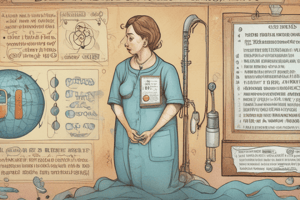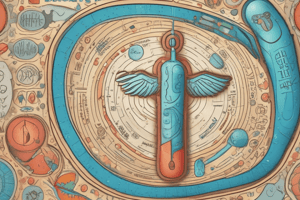Podcast
Questions and Answers
What is a potential drawback of a basal/bolus insulin regime for some patients?
What is a potential drawback of a basal/bolus insulin regime for some patients?
- It is not effective in maintaining good blood glucose control
- It can be overly burdensome for patients who are physically and mentally active (correct)
- It is not suitable for patients with established diabetic complications
- It does not take into account the patient's lifestyle
What is the purpose of calculating the Total Daily Dose (TDD) of insulin?
What is the purpose of calculating the Total Daily Dose (TDD) of insulin?
- To adjust the patient's dietary requirements
- To calculate the total amount of insulin required daily to maintain good blood glucose control (correct)
- To monitor the patient's blood glucose levels
- To determine the optimal type of insulin for a patient
What is the primary goal of a structured approach to insulin therapy?
What is the primary goal of a structured approach to insulin therapy?
- To minimize the patient's lifestyle changes
- To reduce the complexity of insulin therapy
- To eliminate the need for insulin therapy
- To manipulate doses and types of insulin to fit the patient's lifestyle (correct)
What is a common reason why patients may not follow a structured scheduled plan for insulin therapy?
What is a common reason why patients may not follow a structured scheduled plan for insulin therapy?
What is the term used to describe a regimen where insulin doses are taken intermittently, without a structured scheduled plan?
What is the term used to describe a regimen where insulin doses are taken intermittently, without a structured scheduled plan?
What is the primary goal of insulin therapy in patients with diabetes mellitus?
What is the primary goal of insulin therapy in patients with diabetes mellitus?
What is a key factor in adjusting insulin doses safely?
What is a key factor in adjusting insulin doses safely?
According to the Diabetes Control and Complications Trial (DCCT), what was a notable finding in the intensively treated group?
According to the Diabetes Control and Complications Trial (DCCT), what was a notable finding in the intensively treated group?
Why is close monitoring of blood glucose levels necessary when making changes to an insulin regimen?
Why is close monitoring of blood glucose levels necessary when making changes to an insulin regimen?
What is a key consideration in determining the optimal degree of glycemic control for a particular patient?
What is a key consideration in determining the optimal degree of glycemic control for a particular patient?
What is a characteristic of insulin therapy?
What is a characteristic of insulin therapy?
What is the primary goal of insulin therapy in diabetes management?
What is the primary goal of insulin therapy in diabetes management?
What is a common factor that can affect insulin dosage adjustments in both type 1 and type 2 diabetes?
What is a common factor that can affect insulin dosage adjustments in both type 1 and type 2 diabetes?
What is the purpose of carbohydrate counting in insulin dose adjustment?
What is the purpose of carbohydrate counting in insulin dose adjustment?
What is a potential complication of intercurrent illness in type 1 diabetes?
What is a potential complication of intercurrent illness in type 1 diabetes?
Why is regular monitoring of blood glucose levels essential in diabetes management?
Why is regular monitoring of blood glucose levels essential in diabetes management?
What is a potential effect of high stress levels on blood glucose levels?
What is a potential effect of high stress levels on blood glucose levels?
What is the purpose of basal insulin and meal time insulin in insulin dose adjustment?
What is the purpose of basal insulin and meal time insulin in insulin dose adjustment?
Why is emotional or psychiatric problems a consideration in adjusting insulin doses?
Why is emotional or psychiatric problems a consideration in adjusting insulin doses?
What is the term used to describe poor control in the elderly, particularly due to changes in food and eating patterns?
What is the term used to describe poor control in the elderly, particularly due to changes in food and eating patterns?
What is the term used to describe a situation where insulin doses are not regularly reviewed and modified, leading to poor blood glucose control?
What is the term used to describe a situation where insulin doses are not regularly reviewed and modified, leading to poor blood glucose control?
Flashcards are hidden until you start studying
Study Notes
Insulin Therapy and Diabetes Management
- Insulin therapy is crucial for individuals with type 1 or advanced type 2 diabetes to mimic the natural pattern of insulin secretion in healthy individuals.
- The goal of insulin therapy is to maintain near-normal blood glucose levels and prevent or slow chronic complications.
- There are two types of insulin regimens: basal/bolus and twice daily mixed dose.
Factors Affecting Insulin Dosage Adjustments
- Changes in lifestyle, dietary habits, weight reduction, or increased physical activity may require insulin dosage adjustments.
- In type 1 diabetes, insulin requirements generally decrease with time, and patients need to intensify basal insulin analogue to prevent wide fluctuations in blood glucose levels.
- In type 2 diabetes, insulin requirements may also decrease due to improvements in lifestyle, dietary habits, weight reduction, or increased physical activity.
Monitoring Blood Glucose Levels
- Monitoring blood glucose levels is essential to reduce symptoms and the risk of acute complications (hypo or hyperglycemia).
- Regular monitoring of blood glucose levels and being aware of the symptoms and signs of hypo- and hyperglycemia are important.
Insulin Dose Adjustments
- Insulin doses can be adjusted using various techniques, such as basal insulin and meal time insulin.
- Carbohydrate counting is an effective method for adjusting insulin doses based on carbohydrate intake and pre-meal glucose.
- An individual insulin:carbohydrate ratio is established by a healthcare professional to best match the patient's needs.
Other Factors Affecting Insulin Doses
- Physical activity can increase insulin sensitivity, necessitating a reduction in background insulin to avoid hypoglycemia.
- Changes in medication, high stress levels, infection, or surgery can affect blood glucose levels, and insulin doses may need to be adjusted accordingly.
- Temporary increases in insulin doses should occur in small increments with regular blood glucose monitoring to avoid sudden drops in glucose levels.
Optimal Insulin Management
- Optimal insulin management involves reviewing and modifying insulin dose patterns with specific follow-up plans to assess the impact on blood glucose control.
- Patients who are physically and mentally active may require a different insulin regimen than those with established complications and less active nature.
- A structured approach may involve manipulating doses and types of insulin to fit the patient's lifestyle.
Studying That Suits You
Use AI to generate personalized quizzes and flashcards to suit your learning preferences.




